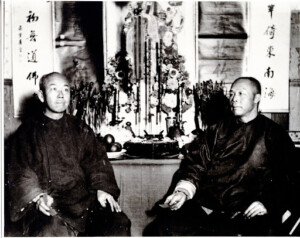
Lunar New Year in Salem, 1897. Dr. Kum on the left and George Sun on the right. WHC Collections. 2015.025.0021
Historical newspapers and photographs document Lunar New Year celebrations by individuals of Chinese heritage in Salem as early as 1872[1] (and likely before)?
The Lunar New Year celebration is one of the most important holidays in China and other Asian countries.[2] As immigrants from China came to Oregon in the 1850s and 1860s, they brought the tradition of celebrating this holiday with them. While not as lavish as celebrations in Portland, Seattle or San Francisco, Salem’s yearly celebrations were a regular and recognized part of the community calendar.[3]
Unfortunately for us, the early historical documentation of Lunar New Year celebrations is very one sided, translated through newspaper reporters on the outside looking in. Cultural and language differences and a thick haze of racial prejudice and slurs, make the newspaper coverage difficult to read, unreliable and narrowed to public-facing aspects of a holiday with a lot of private and family-centered traditions. It is, however, one of the only sources of information about specific celebrations in Salem and the articles do provide some clues if you can read between the lines.
For the non-Chinese population of Salem, the most recognizable harbinger of the Lunar New Year were firecracker displays.[4] “The Average citizen will not have to be told today that the Chinese New Year is on. The burning of punk and the plunkety, plunk, plunk of firecrackers will tell him as much” wrote one reporter in 1891.[5]
The displays were lavish and expensive, and supported by communal fundraising. The ending salvo to the 1889 celebration was described as continuing “for a period of fifteen minutes, during which time there was an incessant roar of big and little cannon. In the way of the dozen Chinese participants had a good time during which their nostrils were tickled with $100 worth of powder smoke. Each of the celebrators bore his share of the expense cheerfully.”[6]
Celebrations brought many complaints. Firecrackers sometimes caused horses hitched downtown to bolt.[7] The holiday closures also interrupted people’s daily routines. One Oregon Statesman reporter wrote in their 1888 diatribe, unsubtlely titled The Bedlamic Period: “Chinese New Years [sic], with all its horrible accompaniments of bombs and firecrackers, begins at 12 o’clock to-night…Every body in Salem knows what China New Years is, especially those confiding bachelors whose single shirt is in the wash, and can’t be gotten out for love or money.”[8] Although the Lunar New Year celebration traditionally lasts 15 days (a lunar cycle), closures for Salem businesses were limited. An 1892 report claimed: “The stores will probably be closed from a week to ten days and the laundries for only a day or two.”[9]
Some of the complaints can be attributed to inconveniences encountered, but some hint at the rampant anti-Chinese attitudes in the community at the time. The Oregon Statesman Editor wrote in 1888: “It is a fortunate thing for residents [of Salem]…that Chinese New Year comes only once a year, and lasts only a week; but it would suit them better if neither Chinese nor their New Year came at all.”[10]
The prejudice was sometimes unevenly applied by individuals in the community, who participated in the event, but also advocated for expulsion of the community. While extolling the generosity of Chinese community members and suggesting that they could “teach the average Christian a lesson of courage and charity worthy of emulation,” another Oregon Statesman reporter called out the hypocrisy of many in Salem, noting that “a refusal to work by the [individuals of Chinese heritage during the holiday], and in a few days those fellows who go around and smoke their cigars during the New Year’s celebration will be crying on the street corners “the Chinese must go.”[11]
It wasn’t all negative. One 1888 reporter noticed a tradition of small boys flocking to the fireworks displays hoping to gather from the debris of the firework show the “little red tubes as escaped destruction in the general fire along the line.”[12] The mayor and city council, in a surprising and uncharacteristic act of good will, even granted special dispensations from the normal code to allow fireworks to be displayed during the Lunar New Year Celebration. The proclamation by Mayor W. M. Ramsey Jan 21, 1887 read: “Permission is hereby granted to the Chinese of the city of Salem to burn firecrackers and Chinese bombs in the immediate vicinity of premises occupied by them during what is called Chinese new year, said firecrackers and bombs not to be burned so as to endanger property.”[13]
Visiting and gift giving are two other traditions widely reported on. The wife of a newspaper man for the Willamette Farmer tried to refuse tea and firecrackers from her neighbor Ah Sin in 1875, until he could convince her that he wasn’t trying to sell it, but rather gift it to her as a present for the New Year, in keeping with tradition.[14] An 1892 article in the Oregon Statesman explained: “Houses will be cleaned and thrown open to all visitors who can partake of refreshments, consisting of Chinese wines, gin, rice, brandy, oranges, candies, sugared fruits and nuts. The candies and fruits are curiosities to the uninitiated Americans…they find they have a peculiar but pleasant flavor…”[15]
Decorations also went up around various Chinese-owned stores and businesses. Strips of dark red paper with Chinese characters “are to be seen in many of the alleyways and entrances.”[16]
By the mid-1920s, large public celebrations in downtown Salem started to decline, likely due, at least in part, to the eviction and demolition of Chinese-owned businesses in the downtown corridor in the name of revitalization. As a Capital Journal reporter noted: “Although their places of business have been torn down…local Chinese are planning on the celebration of their New Year which starts today with high hearts and many hopes for a prosperous and happy times ahead.”[17] Reports of celebrations in the 1930s, 40s and 50s usually focus on individuals inviting friends over for a large banquet in honor of the holiday or on families celebrating within their own homes.
Written and researched by Kylie Pine. Published in the Statesman Journal newspaper February 2023. Republished here with full citations for reference purposes.
Selected transcriptions of Source Materials
***Warning***Please note that these transcriptions are taken directly from original sources and some contain language that is offensive and outdated. To see transcriptions of all source materials used for this article, please contact the Willamette Heritage Center.
“Chinese New Year.” Oregon Weekly Statesman 14 Feb 1872 pg 1
The Chinese New Year began yesterday morning and will close to-night. Celestials generally were jubilant but not boisterous. Yesterday’s performance was a sort of prelude to the programme and to-day there will be high times in Chinadom.
“City Matters” Oregon Statesman 23 Jan 1887 pg 3
The Chinese Granted the Privilege of Burning Firecrackers—Obstruction on Sidewalks
Marshal Ross requests this plumbago manipulator to remind the merchants and business men generally of the city that the ordinance in relation to the obstruction of sidewalks will be rigidly enforced in the future, so look out.
CHINESE NEW YEAR
The following order of the mayor will explain itself. It is now in force:
Salem, Jan 21, 1887
Permission is hereby granted to the Chinese of the city of Salem to burn firecrackers and Chinese bombs in the immediate vicinity of premises occupied by them during what is called Chinese new year, said firecrackers and bombs not to be burned so as to endanger property. This permission to expire on January 31, 1887. W.M. Ramsey, Mayor of Salem.
“Chinese New Year” 21 Jan 1890 pg 4
The great Chinese festival – New Year’s – commenced Sunday night at 12 o’clock, and the Celestial residents of Salem are not behind their brethren of the rest of the world in their desire for its proper observation. They had sufficient good sense to consult the mayor of the city in advance and Mayor Williams had sufficient material of the same kind to inform them that their firecrackers and general hullabaloo must not interfere with street car travel or the passage of other vehicles loaded with women and children. The instructions of the mayor have so far been strictly observed and there is no complaint of annoyance. The fact is, the Chinese of this city are very well behaved and there are few instances where the law is called into its corrective influence with them.
“Needs no Reminder” Oregon Statesman 29 Jan 1891 pg 4
The average citizen will not have to be told today that the Chinese new year is on. The burning of punk and the plunkety plunk plunk of the firecrackers will tell him as much. This is a royal season for the almond*eyed worshipers at the shrine of Confucius. The next six weeks will find Chinatown full of gin and oranges and cigars and revelry. The yellow dragon will fly from the housetops and there will be festivity everywhere among the Celestials.
“The Chinese New Year” Oregon Statesman 28 Jan 1892 pg 4
The residents of Chinatown will begin the feast and create noise today.
Firecrackers and gin will be the order this evening and for the next week in Chinatown. It is New Years eve and the festivities will properly begin this evening, but New Year does not begin until tomorrow, which will be a gala day among the Chinamen. Tomorrow is the first day of their new year, which is the seventeenth of the present Chinese dynasty. Chinamen in this country as a rule work all the time and seldom take a holiday, but when they do, they celebrate with a vengeance, and as it takes a day or two to get started and a day or two to stop their new Years celebration is protracted for several days. The stores will probably be closed from a week to ten days and the laundries for only a day or two.
Although the celebration will be kept up between times there are but four holidays: the first, second, seventh and fifteenth days of the new year. Houses will be cleaned and thrown open to all visitors who can partake of refreshments, consisting of Chinese wines, gin, rice, brandy, oranges, candies, sugared fruits and nuts. The candies and fruits are curiosities to the uninitiated Americans and upon the assurance of their host that they are “velly good,” mistrustingly take and inquisitively nibble of the dainties. They find they have a peculiar but pleasant flavor and becoming bolder partake freely of them and do not regret it unless some malicious friend makes insinuations as to the probably elements of the composition. In the latter event our conscious stricken “white man” seeks relief behind the wood pile. On asking what these candies are made of, the non-committal Celestial simply says, “we no have like in Melica.” The Chinese themselves go from house to house partaking of the refreshments offered at every place, it being considered an insult to refuse to partake of a host’s hospitality. As a result, by the time the celebration is over, the Chinaman has gorged himself with delicacies until he can scarcely move about.
The rooms of the Chinese houses are redolent with the odors of burning joss sticks, oil of sandal wood and dried rose leaves, which, when not too strong, produce a pleasant sensation. Decorations of colored paper, cloth and feather adorn the walls, and miniature idols are on the tables.
The Celestials are equal to Americans in the manner of making New Years calls. All are welcome and treated politely. They present their characters, which are a few Chinese card written upon a long strip of bright red paper. By this card the host forms an opinion of his guest. Their logic, “good letters are written by a bright man,” would hardly prove sufficient among Americans. Their method of greeting is to clasp their hands in front of their chest, which means “you are welcome.”
Money will flow freely during this celebration, as our almond eyed friends will indulge in the best gin and cigars and buy fine clothes, but by no means is this the largest part of their celebration. Their liking for noise is gratified by the constant boom of firecrackers and fireworks. Fourth of July is nothing compared to a Chinese New Year.
Instead of firing the crackers one by one, they tie a string of bunches about fifteen feet long together and fire the whole at once. Several such bunches are frequently fired at one time. They are composed of firecrackers of all sizes and the noise they create may be likened unto pandemonium. In Salem during the new year often several hundred dollars’ worth of firecrackers are burned in one day.
“Chinese New Year Dawns” Daily Capital Journal 03 Feb 1905 pg 5
Amid the beating of Tom Toms and the Roar of Bursting Bombs
Many peaceful and law abiding citizens were startled from their repose in well-earned sleep shortly after midnight last night, by the beating of tom toms and an explosion of fireworks such as is never heard in this city except on the date of the Chinamen’s festival, Chinese New Year; no other holiday is so important in the estimation of the Celestials. A great share of the local Chinamen’s hard-earned savings must have been expended for the purchase of fireworks, Chinese gin, candy and hop, all of which are used extensively in this celebration.
To those astronomically inclined it may be interesting to know that the Chinese New Year falls on the first new moon after the sun enters Aquarius, which makes it come not before January 21st, nor after February 19th. The year is indicated by the age of the reigning emperor, so that the year begun today is the 30th year of Kwang Sui, which translated into English means “Illustrious Succession,” for the emperor’s own name is too sacred to be used in connection with an ordinary event as the merging of one year into an other. The Chinese might be called the original Quakers, so far as their nomenclature for months and days is concerned, for they are really not designated by names, but by the numbers, so that New Year’s day is the “first day of the first month of the 30th year of Kwang Sui.”
“Chinese New Year Celebration Starts Today.” Capital Journal 04 Feb 1924 pg 9
Although their places of business have been torn down to make way for the hand of progress, local Chinese are planning on the celebration of their New Year which starts today with high hearts and many hopes for a prosperous and happy times ahead.
On this occasion the Chinese pay up their debts and remember their friends, as well as holding open house with good cheer and favorite Chinese delicacies. The celebration generally lasts about a week here, although in China two weeks are given over to the festivities.
“Chinese New Year Celebrated Here.” Oregon Statesman 09 Feb 1940 pg 8 ***
In celebration of the 4636th Chinese New Year and of the second anniversary of his establishment in Salem, Yee Sing, proprietor of the Chinese Tea Garden, 162 ½ North Commercial street, entertained about 40 guests with a 10-course Chinese dinner Thursday night.
Some of the courses included chicken soup, loose duck, fried shrimp, pineapple chicken, almond chicken crisp, chow mein, and fried rice. Mr. Yee explained that some Chinese foods are not available here now because of the war but his guests didn’t notice anything missing.
Mr. Yee spoke appreciatively of American friendship for the Chinese cause in the present war. E.A. Brown acted as master of ceremonies.
Jones, Al. “Chinese Court ‘Good Luck’ As ‘Year of the Dog’ Dawns.” Capital Journal18 Feb 1958 pg 5 ILLUSTRATED
Photo caption: Arthur Chinn, above, likes some of the New Year’s traditions of his forefathers. He holds a little red envelope with money in it and a “good luck” tangerine. He is a son of Mr. and Mrs. George Chinn, 4642 Lone Oak Rd. Chinese New Year’s Celebration lasts from new moon to full moon, this year from Feb 18 – March 5 (Capital Journal Photo)
The Year of the Dog 4656 dawned on the Chinese world Tuesday when the “old fashioned” Chinese began an involved festival to court good luck for the coming year. For some of the “new fashioned” Chinese who settled in Salem, observance is for the fun of it rather than for superstitious reasons, according to George Chinn, 4642 Lone Oak Rd.
Chinn defied tradition quickly by letting this reporter in his house. No strangers are allowed in the home on the first day of the New Year because “we want to keep all the good luck to ourselves.”
Chinn, who came to America as a child, and Mrs. Chinn, who came here in 1948, observed New Year’s eve with a traditional dinner. If they followed custom strictly, none of their children would have gone to school today and he wouldn’t go to work.
They did however, have “lucky” tangerines around the house and gave the children small red envelopes with coins inside. Custom back in the home country is to give the envelopes to all the children you know – a big day for kids.
During the year of the Dog, it is considered bad luck not to get a haircut when needed.
Last year New Year began Jan 31, but last year was a sort of leap year with two Augusts. That was because the old Chinese calendar is based on a lunar month of 28 days, leaving 12 months and 364 days, one day unaccounted for.
On the second day there is a big family dinner, with chicken as the main dish, Chinn explained,. Even now, married children living elsewhere cannot return until after ”the fireworks”
During the next two weeks which runs from the new moon Feb. 18 to the full moon on March 5, custom calls for little work and much rest, the Lion dance and the Lantern Festival, when lanterns are hung in every home and carried about in the streets.
“Ready for New Year’s Eve Tonight.” Oregon Statesman 07 Feb 1959 pg 1 Illustrated
Caption: Preparing to celebrate Chinese New Year’s Eve tonight are the four children of Mr. and Mrs. George Chinn 4742 Lone Oak Rd SE. Holding aloft tangerine oranges and red envelopes containing money, both Chinese symbols of good luck are (from left) Georgia, 7, Arthur, 4, Diana 10 and Arnold 9 (Statesman Photo).
Salem’s Dozen Chinese Families All Ready to Start the Year of the Pig
Prange, Conrad
You may be aware ….But Salem’s Dozen Chinese American families know it and will begin celebrating it tonight with traditional Chinese New Year’s eve family dinners.
Unlike American tradition—which calls for a fun-seeking, on the town type of celebration, Chinese custom calls for a quiet New Year’s Eve and a New Year’s Day spent with the family in one’s own house. The round of visiting doesn’t start until the Second Day….
Works Cited
[1] “Chinese New Year.” Oregon Weekly Statesman 14 Feb 1872 pg. 1
[2] Just like any holiday, traditions vary based on familial and regional preferences and heritage. Learn more about Lunar New Year Celebrations in general here:
[3] Literally…see “The Past Year: Chronological Review of the Local Happenings.” Oregon Statesman 1 Jan 1887 pg. 3; and “Chronological Local Happenings of the Year.” Oregon Statesman 01 Jan 1892 pg. 2
[4] Chinese New Year. Oregon Statesman 16 Feb 1893 pg. 4
[5] “Needs no Reminder” Oregon Statesman 29 Jan 1891 pg. 4
[6] “Happy New Year.” Evening Capital Journal 06 Feb 1889 pg. 4
[7] “Dangerous Runaway.” Capital Journal 07 Feb 1902 pg. 2
[8] “The Bedlamic Period.” Oregon Statesman 10 Feb 1888 pg. 3
[9] “The Chinese New Year” Oregon Statesman 28 Jan 1892 pg. 4
[10] Editorial. Oregon Statesman 12 Feb 1888 pg. 2
[11] “Dinna Ye Hear it?” Oregon Statesman 30 Jan 1889 pg. 4
[12] “Rattle-Te-Bang” Oregon Statesman 11 Feb 1888 pg. 3
[13] “City Matters” Oregon Statesman 23 Jan 1887 pg. 3
[14] Chinese New Year’s Gift. Willamette Farmer 05 Feb 1875 pg. 11
[15] “The Chinese New Year” Oregon Statesman 28 Jan 1892 pg. 4
[16] “In a few weeks.” Oregon Statesman 15 Jan 1897 pg. 5
[17] “Chinese New Year Starts Today.” Capital Journal 04 Feb 1924 pg. 9



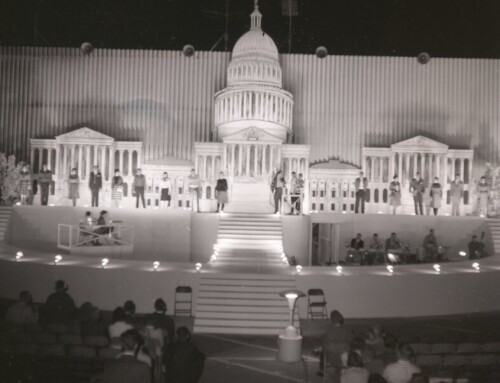
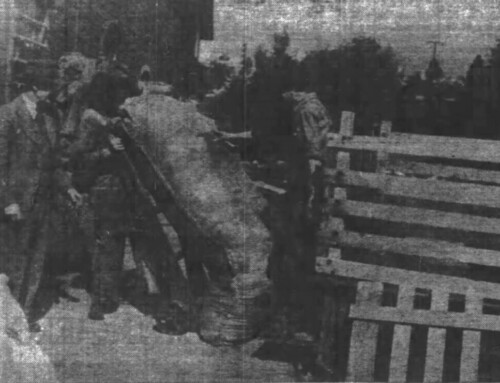
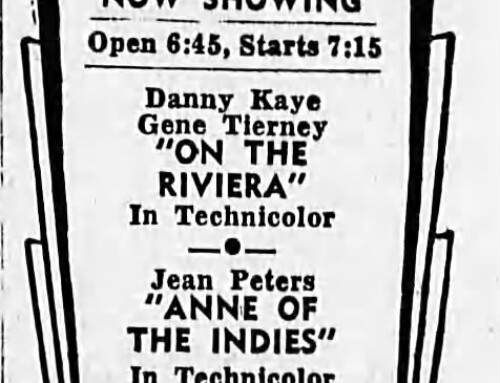
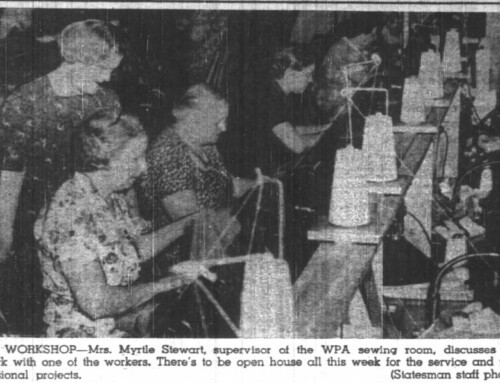
Leave A Comment